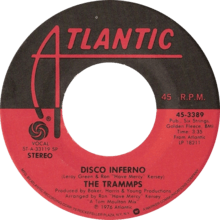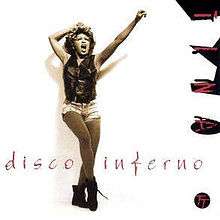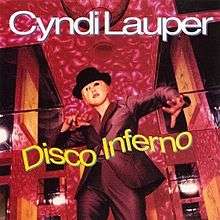Disco Inferno
"Disco Inferno" is a song by American disco band The Trammps from their 1976 fourth studio album of the same name. With two other cuts by the group it reached number-one on the US Billboard Dance Club Songs chart in early 1977, but had limited mainstream success until 1978, after being included on the soundtrack to the 1977 film Saturday Night Fever, when a re-release hit number eleven on the Billboard Hot 100 chart.[1][2]
| "Disco Inferno" | ||||
|---|---|---|---|---|
 Artwork for 1978 reissued US vinyl single | ||||
| Single by The Trammps | ||||
| from the album Disco Inferno | ||||
| B-side | "You Touch My Hot Line" (original) "That's Where the Happy People Go" (reissue) | |||
| Released | December 28, 1976 | |||
| Recorded | 1976 | |||
| Studio | Sigma Sound, Philadelphia, Pennsylvania | |||
| Genre | Disco | |||
| Length |
| |||
| Label | Atlantic | |||
| Songwriter(s) |
| |||
| Producer(s) | Ron "Have Mercy" Kersey | |||
| The Trammps singles chronology | ||||
| ||||
| Audio | ||||
| "Disco Inferno" on YouTube | ||||
| "Disco Inferno" (radio edit) on YouTube | ||||

It was also notably covered in 1993 by American-born singer Tina Turner on the What's Love Got to Do with It soundtrack,[3] and in 1998 by American singer-songwriter Cyndi Lauper on the A Night at the Roxbury soundtrack.[4]
Song information
The song was originally recorded by The Trammps in 1976 and released as a single. It was supposedly inspired by a scene in the 1974 blockbuster film The Towering Inferno.[5] According to Tom Moulton, who mixed the record, the Dolby noise reduction had been set incorrectly during the mixdown of the tracks. When engineer Jay Mark discovered the error and corrected it, the mix had a much wider dynamic range than was common at the time. Due to this, the record seems to "jump out" at the listener. With "Starvin'" and "Body Contact Contract", it topped the U.S. Disco chart for six weeks in the late winter of 1977.[6] On the other U.S. charts, "Disco Inferno" hit number nine on the Black Singles chart, but it was not initially a significant success at pop radio, peaking at number 53 on the Billboard Hot 100.[7]
"Disco Inferno" gained much greater recognition when the 10:54-minute album version was included on the soundtrack to the 1977 film Saturday Night Fever. Re-released by Atlantic Records, the track peaked at number 11 in the U.S. during the spring of 1978, becoming The Trammps' biggest and most-recognized single. Later, it was included in the Saturday Night Fever musical, interpreted by 'DJ Monty' in the "Odissey 2001" discothèque. A cover version of the track was issued by the group Players Association in March, 1978 on the Vanguard record label both in 7" and 12" format. It was produced by Danny Weiss and also issued as a track on their 1979 LP Born to Dance.
On September 19, 2005, "Disco Inferno" was inducted into the Dance Music Hall of Fame.[8]
Personnel
- The Trammps
- Jimmy Ellis – lead vocal
- Robert Upchurch – lead and baritone vocal
- Earl Young – bass vocal
- Harold Wade – first tenor
- Stanley Wade – second tenor
- Additional Personnel
- Ronald Baker – bass guitar
- Earl Young – drums
- Norman Harris, Bobby Eli, T.J. Tindall – guitars
- T.G. Conway – keyboards
- Don Renaldo and His Strings and Horns
Charts
Weekly charts
|
Year-end charts
|
Tina Turner version
| "Disco Inferno" | ||||
|---|---|---|---|---|
 | ||||
| Single by Tina Turner | ||||
| from the album What's Love Got to Do with It | ||||
| B-side | "I Don't Wanna Fight" (Single edit) | |||
| Released | July 12, 1993 | |||
| Recorded | 1993 | |||
| Genre | Pop rock | |||
| Length | 4:03 | |||
| Label | Parlophone | |||
| Songwriter(s) | Leroy Green, Ron Kersey | |||
| Producer(s) | Tina Turner, Chris Lord-Alge, Roger Davies | |||
| Tina Turner singles chronology | ||||
| ||||
Tina Turner covered the song in 1993 for the What's Love Got to Do with It soundtrack and it charted at number twelve in the UK Singles Chart. The single included remixes by The Beatmasters.
Formats and track listings
UK CD single
- "Disco Inferno" (album version) – 4:03
- "I Don't Wanna Fight" (single edit) – 4:25
UK 12-inch single
- "Disco Inferno" (12-inch version) – 5:33
- "Disco Inferno" (12-inch dub) – 6:57
- "Disco Inferno" (album version) – 4:03
UK CD single
- "Disco Inferno" (album version) – 4:03
- "I Don't Wanna Fight" (single edit) – 4:25
- "Disco Inferno" (12-inch version) – 5:33
- "Disco Inferno" (12-inch dub) – 6:57
Charts
Weekly charts
| Chart (1993) | Peak position | |
|---|---|---|
| Australia (ARIA)[14] | 56 | |
| scope="row" | Belgium (Ultratop 50 Flanders)[15] | 10 |
| Europe (European Hot 100 Singles)[16] | 38 | |
| Iceland (Íslenski Listinn Topp 40)[17] | 4 | |
| scope="row" | Ireland (IRMA)[18] | 13 |
| scope="row" | Netherlands (Dutch Top 40)[19] | 16 |
| scope="row" | New Zealand (Recorded Music NZ)[20] | 25 |
| scope="row" | UK Singles (Official Charts Company)[21] | 12 |
Cyndi Lauper version
| "Disco Inferno" | ||||
|---|---|---|---|---|
 | ||||
| Single by Cyndi Lauper | ||||
| from the album A Night at the Roxbury | ||||
| Released | August 3, 1999[25] | |||
| Recorded | 1999 | |||
| Genre | Disco | |||
| Length | 3:18 | |||
| Label | Jellybean Records | |||
| Songwriter(s) | Leroy Green, Ron Kersey | |||
| Producer(s) | Cyndi Lauper, Mark Saunders, Jan Pulsford | |||
| Cyndi Lauper singles chronology | ||||
| ||||
Cyndi Lauper performed this song live for the first time at New York, Bryant Park on June 21, 1998.
In the Billboard magazine dated May 16, 1998 in the "Dance Trax" column, there was a story on remixers Bobby Guy and Ernie Lake, aka Soul Solution: "They are working with Cyn on a chest-pounding rendition of 'Disco Inferno'. The cut will be featured on the forthcoming soundtrack to A Night At Roxbury."
Although the original release date of the maxi single was August 3, 1999, it was distributed from July 24 in some regions. The single was officially released in the U.S. in August 1999. Lauper performed it at many shows, including her Summer Tour '99, around the time of its release.
Official versions
- Boris & Beck Roxy Edit Dub
- Boris & Beck Roxy Dub
- Club Mix
- Rescue Me Mix
- Soul Solution A Capella
- Soul Solution Drumapella
- Soul Solution Mix
- Soul Solution Radio Edit
Accolades
| Year | Nominee / work | Award | Result |
|---|---|---|---|
| 1999 | "Disco Inferno" | Grammy Award for Best Dance Recording | Nominated |
Appearances in other media
Film
- In 1996, "Disco Inferno" was included on the soundtrack to the cult comedy film Kingpin and featured in two pivotal scenes in which Roy Munson (played by Woody Harrelson) confidently strolls into a bowling alley.
- The song was used in the trailer to the Adam Sandler comedy Bedtime Stories.
- In the Shrek 2 animated short Far, Far, Away Idol, Donkey (Eddie Murphy) is shown singing "Disco Inferno", but has his rear set on fire as Dragon performs with him.
- The recording by The Trammps was played in the 1997 film Donnie Brasco, 2004 film What the Bleep Do We Know!?, and in the 2011 film Hop.
- "Night Fever" (another song from Saturday Night Fever movie soundtrack, performed by the Bee Gees) and "Disco Inferno" appeared and were included in the soundtrack of the 1999 movie Mystery Men.
- The Trammps' version is danced to by Mari and Sadie in the film Little Voice as a celebration, in Mari's living room.
- In The Exterminator, The Trammps' version of the song is heard playing at the Ghetto Ghouls' hideout, when John Eastland (Robert Ginty) infiltrates it.
- The Trammps' version is heard in the background of a scene in the movie Ghostbusters. In 2006, the extended version was featured on a remastered version of the Ghostbusters soundtrack.[29]
- The Trammps' version is heard in a scene in the movie Talk Radio.
- The song is featured in the film Hobo with a Shotgun while the film's villains fire a flamethrower upon a school bus full of children.
- This song is heard in a scene in The Emoji Movie in the Just Dance app scene.
TV
- The song was hummed by character David Brent during his infamous dance in the TV series The Office.
- In The Simpsons, season 13, ep. 10, "Half-Decent Proposal", The Trammps' version was featured in a reenactment of Marge's prom during the 1970s.
- The song was performed by Mercedes Jones (Amber Riley) in the 2012 Glee episode "Saturday Night Glee-ver".
- In the TV series Everybody Loves Raymond, The Trammps' version played on the stereo while Raymond and Robert did a photoshoot in Raymond's basement.
- The lyrics are read out by fire safety officer Keith Lard in the first series of Phoenix Nights, thinking they describe a real incident.
- The Trammps' version is heard on series 4, episode 4 of the British teen drama Skins and also on Season 3, Episode 2 of Scandal.
- Appears in the fourth episode of the Italian crime series Romanzo Criminale.
- Also appears in the 9th episode of Suits in its second season where Louis dances into the office after getting promoted to Senior Partner and after Donna got rehired by Harvey.
- Earl Young performs the song as himself on the fourth episode of the second season of Big Little Lies, hired by character Renata Klein to perform at her daughter Amabella's 1970's-themed birthday party.
- It was heard on PowerPC G3 commercial
Video games
- A version of the song recorded by The Earl Young Band was included in the video games Dungeon Keeper 2 and Bulletstorm.
- The Trammps' version was featured in a mashup mix in DJ Hero, alongside Rihanna's "Disturbia".
- The Trammps' version appeared on the Grand Theft Auto IV expansion pack The Ballad of Gay Tony.
- The Trammps' version appeared on the video game Dance Central 3 represented by Miss Aubrey (Lu$h Crew).
- The first piece of downloadable content for the Dante's Inferno videogame, entitled Dark Forest, includes an additional "Disco Inferno" costume, a novelty piece in the style of polyester disco fashion wear inspired by The Trammps's song.
- The Trammps' version appeared on the Zombies map Shaolin Shuffle' of the video game Call of Duty: Infinite Warfare.
- The Trammps' version appeared in the video game series Destroy All Humans!
- The Trammps' version appeared in the video game Far Cry 5.
Sports
- The song also became an unofficial theme song for former New York Yankees outfielder Bernie Williams. It was often played at old Yankee Stadium while the scoreboard and video systems displayed the phrase "Bern Baby Bern", a play on the song's refrain and Williams' first name.[30]
References
- "The Trammps Billboard singles". AllMusic. Retrieved January 21, 2012.
- Dys, Andrew (March 8, 2012). "'Disco Inferno' singer Jimmy Ellis of Rock Hill dies at 74". The Herald. Rock Hill, SC. Retrieved March 9, 2012.
- "Disco Inferno Lyrics - Tina Turner". Sing365.com. Archived from the original on February 10, 2009. Retrieved June 28, 2014.
- "Disco Inferno Lyrics by Cyndi Lauper - Night At The Roxbury Soundtrack Lyrics". Lyricsondemand.com. Retrieved June 28, 2014.
- "DeepSoul: The Trammps - "Disco Inferno"". DeepSoul.com. Retrieved June 3, 2012.
- Whitburn, Joel (2004). Hot Dance/Disco: 1974-2003. Record Research. p. 263.
- Whitburn, Joel (2004). Top R&B/Hip-Hop Singles: 1942-2004. Record Research. p. 587.
- "Trammps Frontman Jimmy Ellis of Disco Inferno Fame Dies | E! Online UK". Eonline.com. Retrieved June 28, 2014.
- RPM May 14, 1978
- "Cash Box Top 100 Singles, May 27, 1978". Archived from the original on February 14, 2015. Retrieved April 22, 2018.
- "Top 200 Singles of '78 – Volume 30, No. 14, December 30 1978". RPM. Library and Archives Canada. Retrieved February 9, 2018.
- Musicoutfitters.com
- "Cash Box Year-End Charts: Top 100 Pop Singles, December 30, 1978". Archived from the original on September 29, 2018. Retrieved April 22, 2018.
- Ryan, Gavin (2011). Australia's Music Charts 1988-2010. Mt. Martha, VIC, Australia: Moonlight Publishing.
- "Ultratop.be – Tina Turner – Disco Inferno" (in Dutch). Ultratop 50. Retrieved October 6, 2015.
- "Hits of the World" (PDF). Billboard. Prometheus Global Media. September 25, 1993. Retrieved October 6, 2015.
- "Íslenski Listinn Topp 40 (23.09.1993 – 29.09.1993)". Dagblaðið Vísir (in Icelandic). September 23, 1993. p. 20. Retrieved March 9, 2018.
- "The Irish Charts – Search Results – Disco Inferno". Irish Singles Chart. Retrieved October 6, 2015.
- "Nederlandse Top 40 – week 47, 1993" (in Dutch). Dutch Top 40 Retrieved October 6, 2015.
- "Charts.nz – Tina Turner – Disco Inferno". Top 40 Singles. Retrieved October 6, 2015.
- "Tina Turner: Artist Chart History". Official Charts Company. Retrieved October 6, 2015.
- "Jaaroverzichten 1993" (in Dutch). Ultratop. Retrieved July 15, 2020.
- "Árslistinn 1993". Dagblaðið Vísir (in Icelandic). January 4, 1994. p. 16. Retrieved June 1, 2020.
- "Jaarlijsten 1993" (in Dutch). Stichting Nederlandse Top 40. Retrieved October 12, 2015.
- "Disco Inferno by Cyndi Lauper | MTV". Vh1.com. August 3, 1999. Retrieved June 28, 2014.
- "Cyndi Lauper - Disco Inferno". Discogs.com. October 6, 2016. Retrieved October 11, 2016.
- "Cyndi Lauper - Chart history". Billboard. Retrieved October 11, 2016.
- "Cyndi Lauper | Awards". AllMusic. June 22, 1953. Retrieved October 11, 2016.
- "Ghostbusters: Alternative Rock Music". Amazon.com. Retrieved June 28, 2014.
- "Bern Baby Bern: Bernie Williams' Burning Desire for Baseball Relit". Bleacher Report. March 28, 2009. Retrieved June 28, 2014.